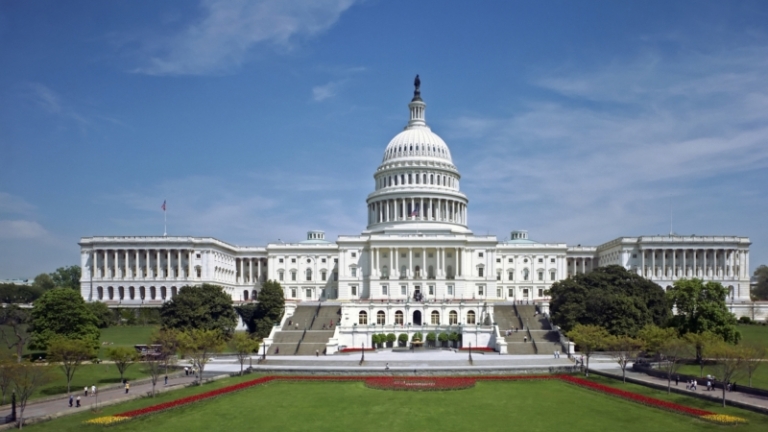
I. Legislative Branch
1) Legislation
House to Begin NDAA Markup.During the week of September 8, the House Rules Committee expects to begin its mark up of H.R. 3838, the “Streamlining Procurement for Effective Execution and Delivery and National Defense Authorization Act for Fiscal Year 2026.”
As of September 1, lawmakers had submitted 1,005 amendments, including many about Israel. Reps. Mike Lawler (R-NY) and Josh Gottheimer (D-NJ) proposed to amend an anti-boycott law to include boycotts of Israel by international governmental organizations. Rep. Claudia Tenney (R-NY) introduced an amendment requiring the Department of Defense to use the term “Judea and Samaria” instead of “the West Bank,” while Rep. Gottheimer introduced an amendment to bar Department of Defense contracts with any party that boycotts Israel or Israeli settlements.
2) Personnel and Correspondence
Democratic Senators Call for Aid Surge and Ceasefire. During an eight-day trip beginning on August 25, Sens. Jeff Merkley (D-OR) and Chris Van Hollen (D-MD) visited Israel, the West Bank, Egypt, and Jordan. In Israel, they toured Kfar Aza, a kibbutz attacked by Hamas on October 7. They then visited Egypt’s closed Rafah crossing and joined a Jordanian aid airdrop flight to Gaza. Throughout their travels, they accused the Israeli authorities of obstructing aid to Gaza and called for an immediate ceasefire and the return of hostages. Their trip also focused on settler violence in the occupied West Bank, where they met with families of Palestinian-American victims killed in recent settler attacks in Taybeh.
House Education Committee to Investigate Antisemitism at Three Medical Schools. On August 25, Education and Workforce Committee Chairman Tim Walberg (R-MI) sent letters to three medical schools (the University of Illinois, the University of California, San Francisco, and the University of California, Los Angeles), demanding information regarding alleged antisemitic activity on campus.
Shaheen Leads Delegation to Jordan, Syria, and Lebanon. On August 25, Senate Foreign Relations Committee Ranking Member Jeanne Shaheen (D-NH) led a bipartisan, bicameral delegation with Rep. Joe Wilson (R-SC) to Jordan, where they met with King Abdullah II. Shaheen also met with Foreign Minister Ayman al-Safadi to discuss the worsening humanitarian crisis in Gaza, rising insecurity in the West Bank, and Jordan’s support for Syria’s transition.
The same day, the delegation traveled to Syria, where they joined US Ambassador to Turkey and Special Envoy for Syria Thomas Barrack in a meeting with interim President Ahmed al-Sharaa. The trip marks the most significant congressional engagement with Syria since the fall of the Bashar al-Assad regime. During the meeting with al-Sharaa, Shaheen emphasized the importance of inclusive governance and discussed bipartisan US legislation to repeal the Caesar Act. She also met with several Syrian officials, General Mazloum Abdi of the Syrian Democratic Forces (SDF), and religious and civil society leaders to discuss civil society development, accountability, reconstruction, reconciliation, and the integration of the SDF into the Syrian armed forces.
On August 26, the delegation, joined by Sen. Lindsey Graham (R-SC), Special Envoy Barrack, and Deputy Special Envoy for Middle East Peace Morgan Ortagus, met with Lebanese President Joseph Aoun and several Lebanese officials. Shaheen also met with Druze leader Walid Jumblatt to discuss Lebanon’s relationship with Syria, and with the presidents of the Lebanese American University and the American University of Beirut to address the Trump administration’s freeze on scholarship funding.
DNC Fails to Advance Resolutions on Gaza War. On August 26, the Democratic National Committee (DNC) voted down a resolution calling for an immediate ceasefire in Gaza, an arms embargo on Israel, the suspension of US military aid, and recognition of a Palestinian state. A separate resolution introduced by DNC Chairman Ken Martin calling for a ceasefire, increased humanitarian aid to Gaza, the immediate release of hostages, and a two-state solution was initially advanced by the DNC. However, after the other resolution was rejected, Martin withdrew his proposal and announced the formation of a task force to discuss the matter.
Democrats Press Rubio to Allow Injured Palestinian Children into the United States. On August 26, Reps. Debbie Dingell (D-MI) and Kim Schrier (D-WA) led 141 other House Democrats in a letter urging Rubio to reverse a recent decision to halt approvals of temporary medical-humanitarian visas for children from Gaza.
More Than 100 Lawmakers Urge Surge of Baby Formula and Aid to Gaza.On August 26, Reps. Ayanna Pressley (D-MA) and Brittany Pettersen (D-CO) led 101 other House Democrats in calling on the Trump administration to press the Israeli government to facilitate a massive surge in humanitarian aid to Gaza, particularly baby formula. The letter also criticized the Gaza Humanitarian Foundation, claiming that its assistance excludes baby formula and that it has delivered “only a tiny fraction of the aid” provided by the previous UN-coordinated system.
On August 29, Sens. Ruben Gallego (D-AZ), Peter Welch (D-VT), Tim Kaine (D-VA), Mark Kelly (D-AZ), and Elizabeth Warren (D-MA) similarly called on the administration to facilitate an aid surge to Gaza.
Bipartisan Lawmakers Call on Israel to End Syria Strikes. On August 28, Sens. Shaheen and Joni Ernst (R-IA) and Rep. Wilson called on Israel to end its strikes on Syria, saying that the attacks make stability in that country “more difficult to achieve.”
II. Executive Branch
1) White House
Trump Is “Not Happy” with Israeli Strikes on Gaza Hospital. On August 25, President Donald Trump said he was “not happy” about Israel’s strikes that day on a hospital in Gaza that killed some 22 people, including five journalists.
Trump Hosts Meeting on Gaza. On August 27, President Trump chaired a White House meeting with former British prime minister Tony Blair and former Middle East envoy Jared Kushner to discuss postwar plans for Gaza, as well as efforts to secure the release of remaining hostages and to expand food aid deliveries. The day before, Special Envoy Steve Witkoff said that the war in Gaza would end “one way or another” by the end of the year.
On August 31, the Washington Post reported that the Trump administration is discussing a post-war plan for Gaza that would convert the Strip into a US-administered trusteeship, relocate Gaza’s more than 2 million people outside of the territory, and transform it into a high-tech manufacturing, technology, and tourism hub.
Trump Plans to Cut $4.9 Billion in Foreign Aid Without Congressional Approval.On August 28, President Trump notified Congress of his administration’s plans to rescind $4.9 billion in congressionally appropriated foreign aid using an obscure and controversial procedure known as a “pocket rescission.”
Trump Says Israel Is Losing Support in Congress.On August 29, President Trump said in an interview with the Daily Caller that while Israel “may be winning the war,” it is “not winning the world of public relations” and no longer holds “total control over Congress.”
2) Department of State
Syria Envoy Discusses Plan for Hezbollah Disarmament. On August 26, Special Envoy Barrack told reporters after a meeting with Lebanese President Aoun that Lebanon would propose a plan by August 31 to disarm Hezbollah, with Israel expected to offer a corresponding framework for military withdrawal from Lebanese territory. He added that Saudi Arabia and Qatar are prepared to invest in an economic zone in southern Lebanon to provide livelihood opportunities for Hezbollah members once they disarm. During his press conference, Barrack provoked anger when he told Lebanese journalists to “act civilized” and not be “animalistic.” His remarks sparked protests in southern Lebanon that forced the cancellation of his planned visit to the towns of Tyre and Khiyam. On August 28, Barrack apologized for his comments.
Rubio Meets with Israeli Foreign Minister. On August 27, Secretary of State Marco Rubio met with Israel’s Minister of Foreign Affairs Gideon Sa’ar to reaffirm US commitment to Israel’s security and discuss Gaza, Lebanon, Syria, and Iran. Following the meeting, Sa’ar told reporters that there will not be a Palestinian state.
Rubio Discusses Iran with European Counterparts and IAEA Director General. On August 27, Secretary Rubio spoke with his British, French, and German counterparts regarding efforts to prevent Iran from developing a nuclear weapon. That same day, Rubio met with International Atomic Energy Agency (IAEA) Director General Rafael Grossi to discuss nuclear safety, including monitoring and verification efforts in Iran.
Rubio Welcomes European Effort to Reimpose UN Sanctions on Iran. On August 28, France, Germany, and the United Kingdom initiated the snapback of sanctions on Iran under United Nations Security Council Resolution 2231. Rubio applauded the move, adding that the United States “remains available for direct engagement with Iran—in furtherance of a peaceful, enduring resolution to the Iran nuclear issue.”
Rubio Speaks with Turkish Foreign Minister. On August 28, Rubio spoke with Turkish Foreign Minister Hakan Fidan to discuss, the US readout said, their “continued support for peace and stability in the Middle East.”
Rubio Bars Palestinian Officials from UN Meeting, Expands Visa Restrictions. On August 29, Secretary of State Rubio announced that the United States will not issue visas for members of the Palestine Liberation Organization and the Palestinian Authority to attending the United Nations General Assembly in New York this month. On August 31, the New York Times reported that earlier in August, the Department of State ordered broader suspension of approvals of almost all types of visitor visas for Palestinian passport holders.
3) Department of Defense
AFRICOM Conducts Strikes in Somalia. On August 23, US forces conducted an airstrike against al-Shabab in Somalia.
Egypt, United States Launch Bright Star Military Exercises. On August 28, US Central Command (CENTCOM) and the Egyptian Armed Forces launched Bright Star 25, the latest in a series of US-Egypt military exercises that began in 1980. This year’s exercise will run through September 10, 2025, and include participation from more than 40 countries.

